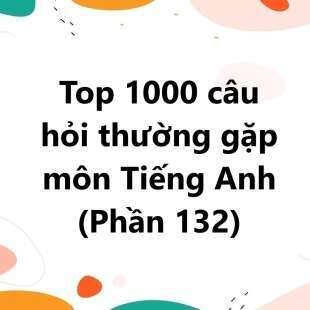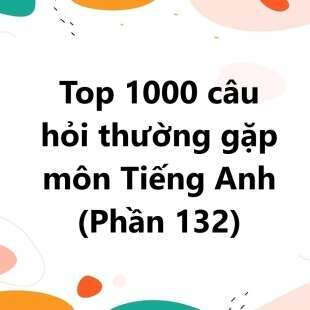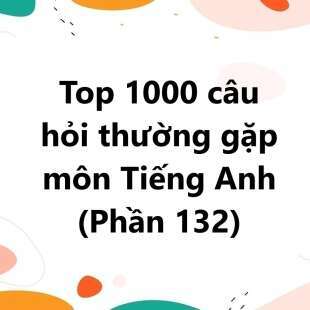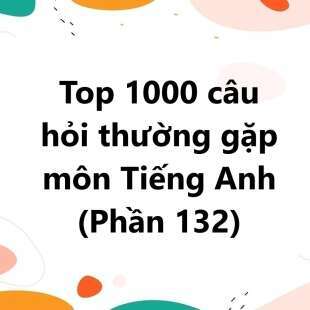Tailieumoi.vn biên soạn và giới thiệu bộ câu hỏi Tiếng Anh gồm các kiến thức lý thuyết và thực hành, giúp học sinh ôn tập và bổ sung kiến thức cũng như hoàn thành tốt các bài kiểm tra môn Tiếng Anh. Mời các bạn đón xem:
Top 1000 câu hỏi thường gặp môn Tiếng Anh (Phần 47)
Câu 18: Đọc đoạn văn sau và chọn câu trả lời thích hợp nhất cho mỗi câu hỏi:
As a result of years of research, we know that too much animal fat is bad for our health. For example, Americans eat a lot of meat and only a small amount of grains, fruit and vegetables. Because of their diet, they have high rates of cancer and heart disease; In Japan, in contrast, people eat large amounts of grains and very little meat. The Japanese also have very low rates of cancer and heart disease. In fact, the Japanese live longer than anyone else in the world.
Unfortunately, when Japanese people move to the United States, the rates of heart disease and cancer increase as their diet changes. Moreover, as hamburgers, ice-cream, and other high-fat foods become popular in Japan, the rates of heart disease and cancer are increasing there as well. People are also eating more meat and dairy products in other countries such as Cuba, Mauritius and Hungary. Not surprisingly, the disease rates in these countries are increasing along with the change in diet. Consequently, doctors everywhere advise people to eat more grains, fruit and vegetables and to eat less meat and fewer dairy products.
1. What is the main idea of this passage?
A. Doctors advise people to eat more grains, fruit and vegetables.
B. Eating meat causes cancer and heart disease.
C. The kind of diet we have can cause or prevent diseases.
D. Children eat the same way their parents eat.
2. Why do the Japanese have low rates of cancer and heart disease?
A. Because they eat a lot of grains and very little meat.
B. Because they do eat animal fat.
C. Because their diet changes.
D. Because they live longer than anyone else in the world.
3. “…the Japanese live longer than anyone else…” What does anyone else mean?
A. some other people
B. all other people
C. most other people
D. nobody
4. Which place does the word there refer to?
A. in the United States.
B. in Cuba.
C. in Japan.
D. in Cuba, Mauritius and Hungary.
Lời giải:
Đáp án:
|
1. C |
2. A |
3. B |
4. C |
Giải thích:
1. Dẫn chứng “As a result of years of research ... fewer dairy products.”
2. Dẫn chứng “In Japan, in contrast, people eat large amounts of grains and very little meat.”
3. Dẫn chứng “In fact, the Japanese live longer than anyone else in the world.”
4. Dẫn chứng “Moreover, as hamburgers, ice-cream, and other high-fat foods become popular in Japan, the rates of heart disease and cancer are increasing there as well.”
Dịch: Từ kết quả của nhiều năm nghiên cứu, chúng tôi biết rằng quá nhiều chất béo động vật có hại cho sức khỏe của chúng ta. Ví dụ, người Mỹ ăn nhiều thịt và chỉ ăn một lượng nhỏ ngũ cốc, trái cây và rau củ. Vì chế độ ăn uống của họ, họ có tỷ lệ mắc bệnh ung thư và bệnh tim cao; Ngược lại, ở Nhật Bản, người ta ăn nhiều ngũ cốc và rất ít thịt. Người Nhật cũng có tỷ lệ mắc bệnh ung thư và bệnh tim rất thấp. Trên thực tế, người Nhật sống lâu hơn bất kỳ ai khác trên thế giới.
Thật không may, khi người Nhật chuyển đến Hoa Kỳ, tỷ lệ mắc bệnh tim và ung thư tăng lên khi chế độ ăn uống của họ thay đổi. Hơn nữa, khi bánh mì kẹp thịt, kem và các loại thực phẩm giàu chất béo khác trở nên phổ biến ở Nhật Bản, tỷ lệ mắc bệnh tim và ung thư cũng đang gia tăng ở đó. Người dân ở các nước khác như Cuba, Mauritius và Hungary cũng đang ăn nhiều thịt và các sản phẩm từ sữa hơn. Không có gì ngạc nhiên khi tỷ lệ bệnh tật ở các quốc gia này đang gia tăng cùng với sự thay đổi trong chế độ ăn uống. Do đó, các bác sĩ ở khắp mọi nơi khuyên mọi người nên ăn nhiều ngũ cốc, trái cây và rau quả, ăn ít thịt và ít sản phẩm từ sữa.
Xem thêm các nội dung khác:






